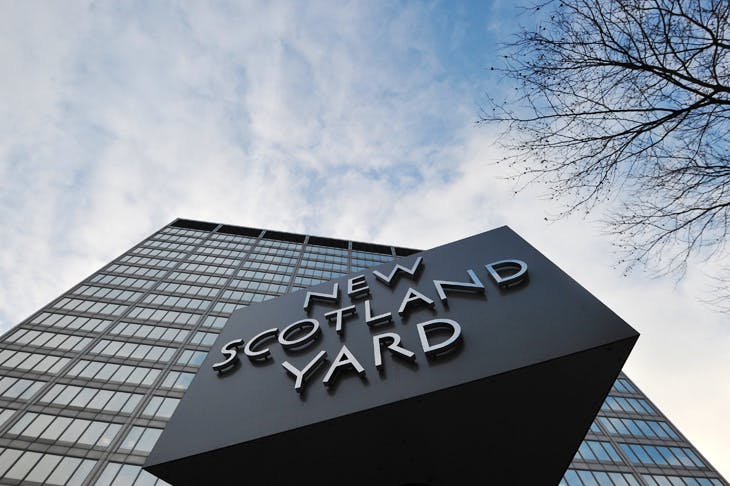This week, 49,000 gay men were granted posthumous pardons. Had Harold Macmillan’s government taken notice of this magazine in 1957 that number would have been far smaller. After the Wolfenden Report, we called for decriminalisation of homosexual acts between consenting adults and at the time we stood out among Fleet Street publications in taking this view, earning us the appellation ‘The Bugger’s Bugle’.
It would be tempting to think that the pardons, which form part of the Policing and Crime Bill, mark the end of a dark chapter. No longer, we are invited to believe, could good people like Alan Turing — himself pardoned in 2013 — be hounded to their deaths by misplaced and misapplied hysteria.
Yet our legal system still struggles to cope with sex offences. Issuing posthumous pardons for gay men is the easy bit for ministers — it costs them nothing to apologise for the actions of distant predecessors. What is far harder, but more urgent, is to apologise to the innocent people who have been hounded after being falsely accused of various sex offences in the febrile atmosphere since Jimmy Savile’s crimes were posthumously exposed in 2012.
Sixty years ago, the (many) critics of The Spectator’s stance argued that the law should reflect public opinion, rather than seek to steer it. If the consensus was that homosexuality should be punishable in the courts, that’s where the matter should end. In a front-page article, we argued differently: no national mood or newspaper moralist can justify keeping an ‘irrational and illogical’ law which was passed late one night in 1885 without discussion and possibly by mistake. Furthermore, when judges and policemen are expected to relax or intensify their efforts based on public opinion, the conditions are set for a witch hunt. The last few years have demonstrated the truth of this.
Lord Bramall, former chief of the defence staff, deserves to have his innocence recognised as firmly as that of Alan Turing. When accusations of historic child abuse were made against him, his home was raided by 20 police officers. The accusations were at once put in the public domain — though not the identity of his accuser, which remains secret. What the Metropolitan Police were less keen to advertise was that the allegations soon turned out to be groundless. The investigation continued for months after it had been officially halted. Lord Bramall’s wife died without knowing that her husband had been cleared. At first, the Met insisted that it had nothing to apologise for. Then, when it was eventually forced to apologise, it did so without any public acknowledgement of the wrong.
There is a long list of men who have been treated in the same way as Lord Bramall: Cliff Richard, Lord Brittan, Harvey Proctor, Nigel Evans, Paul Gambaccini. Gambaccini was needlessly kept on bail for 12 months after a police investigation began and he has calculated that he was left £200,000 poorer as a result of legal bills and lost earnings.
All these cases have the same root cause. Following the Savile revelations, police forces and the Crown Prosecution Service sensed that public opinion over past failures was running so high that sex offences must be made a special case. The usual guards of legal process could be lowered in order to satisfy the public clamour for prosecutions. Accusers were automatically described as ‘victims’, who had a right not just to be taken seriously, but to be believed. The hysteria reached a peak in 2014 when a Metropolitan Police offer described allegations of a VIP paedophile ring as ‘credible and true’ — effectively trying to prejudge the outcome of any resulting criminal case. It later turned out that the accusations, made by a man known only as ‘Nick’, were neither credible nor true; but not before public figures such as Lord Bramall were dragged through the mud.
Homes of the accused have been raided in police operations designed to attract as much publicity as possible. When searching Cliff Richard’s Berkshire home, the police tipped off the BBC, which launched a helicopter. Police have excused this kind of behaviour on the grounds that the publicity encourages ‘other victims’ to come forward.
Unquestionably, there are many historic child sex offences which have gone unpunished, but the manner in which the recent investigations have been conducted has also encouraged fantasists and compensation-hunters. Payments have been made to alleged victims of Jimmy Savile merely on the grounds that they were in a situation in which they could have been abused by him — with no evidence required.
That is not justice but a travesty of it. Little has been done to redress the imbalance. On the contrary, the government perseveres with an inquiry into establishment child abuse which lurches from one crisis to another. Little consideration has been given to the iniquity whereby the names of the accused are broadcast far and wide while accusers are granted lifelong anonymity — even if it emerges that they are lying.
It is 60 years since Lord Wolfenden recommended the decriminalisation of homosexual acts and 50 years since this was acted upon. We hope that it will not take so long to acknowledge the overzealous and damaging way in which alleged sex offences have been investigated, and the inexcusable reluctance of politicians and the police to apologise and clear the names of those falsely accused.
Got something to add? Join the discussion and comment below.
Get 10 issues for just $10
Subscribe to The Spectator Australia today for the next 10 magazine issues, plus full online access, for just $10.














Comments
Don't miss out
Join the conversation with other Spectator Australia readers. Subscribe to leave a comment.
SUBSCRIBEAlready a subscriber? Log in